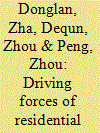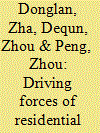| Srl | Item |
| 1 |
ID:
096648


|
|
|
|
|
| Publication |
2010.
|
| Summary/Abstract |
There exist many differences between urban and rural China among which residential CO2 emissions arising from energy consumption is a major one. In this paper, we estimate and compare the energy related CO2 emissions from urban and rural residential energy consumption from 1991 to 2004. The logarithmic mean Divisia index decomposition analysis is then applied to investigate the factors that may affect the changes of the CO2 emissions. It is found that energy intensity and the income effects, respectively, contributed most to the decline and the increase of residential CO2 emissions for both urban and rural China. In urban China, the population effect was found to contribute to the increase of residential CO2 emissions with a rising tendency. However, in rural China, the population effect for residential CO2 emissions kept decreasing since 1998.
|
|
|
|
|
|
|
|
|
|
|
|
|
|
|
|
| 2 |
ID:
097481


|
|
|
|
|
| Publication |
2010.
|
| Summary/Abstract |
There exist many differences between urban and rural China among which residential CO2 emissions arising from energy consumption is a major one. In this paper, we estimate and compare the energy related CO2 emissions from urban and rural residential energy consumption from 1991 to 2004. The logarithmic mean Divisia index decomposition analysis is then applied to investigate the factors that may affect the changes of the CO2 emissions. It is found that energy intensity and the income effects, respectively, contributed most to the decline and the increase of residential CO2 emissions for both urban and rural China. In urban China, the population effect was found to contribute to the increase of residential CO2 emissions with a rising tendency. However, in rural China, the population effect for residential CO2 emissions kept decreasing since 1998.
|
|
|
|
|
|
|
|
|
|
|
|
|
|
|
|